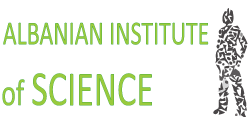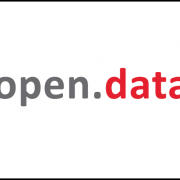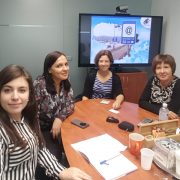AIS Study visit at LiA
Albanian Institute of Science is a small organization based in Tirana, Albania . AIS main focus in to use technologies in profit of the citizens. AIS is promotor of Open Data in Albania and first Hackathon organizer. Two of our members Besjana Hysa, Project Manager and Orsela Droja Youth Participation Activist represented AIS in this Study Visit.
Destination ?
Langas į ateitį ( Windows to the Future) an organization that aims to promote the use of Internet and e-services in Lithuania and hereby stimulate the growth of the standard of living, as well as Lithuania’s competitiveness among European and other countries of the world based in Vilnius Lithuania.
On the first day we got to visit Langas į ateitį offices and exchange a little bit of information about both our countries. For example both Albania and Lithuania has a population around 3 million citizens and Albania has 61 municipalities, only one more than Lithuania that has 60.
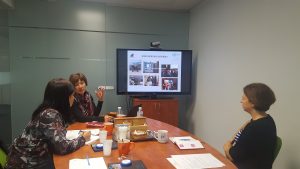
After exchange of some main information we got to work and share our project and work experiences. We got a lot of information in LiA main projects as:
-
Online services for a Lithuanian e-citizen, a project that took place in 2010-2012 and reached 259 participants. The project target groups were: unemployed, people with disabilities and rural population, which learnt to use computer, internet and e-services, representatives of more socially vulnerable groups are able to integrate more quickly into the community life and labour market and have more possibilities to study and communicate. The project was implemented together social partners: Lithuanian Labour Exchange, Society for the Physically Disabled of Lithuania, 35 municipal public libraries.
-
Use it and enjoy it. Project goal were to share experience with Scandinavian partners in the field of ICT training methodology for seniors, explore mmethodologies for adult education and facilitate its development. Result – best practice package „Engaging Seniors to use ICT.
-
Trans eScouts, Empowering eFacilitator intergenerational dialogue. The idea was to empower e-facilitators for intergenerational dialogue (ICT and life experience). Target audience were 16-25 youth and 55+ and partners in this project were 4 countries: Lithuania, Latvia, Croatia, They collaborate with Vilnius city libraries for developing this project . One of the libraries we visited on the second day.
-
Generation 0101 A project were where created Free Educational Materials in 6 Languages in 7 educational modules:- E-journalism, -Mobile application development, -Web design,- Community web radio,- Online collaboration tools for youth, -Easy coding,- Video.
Also we shared our experience for some of our projects as are :

-
Open Data Albania: The first AIS project, aimd to open as much Governmental Financal Data as we can related to Budget, assets of declarations , procurements and in the end companies that win governmental data.
-
Hackathons that we have held throug the years, in particular a Diplohack. A #DiploHack combines the specific know-how and skill sets of NGO’s, social entrepreneurs, tech developers and designers, and those of diplomats, journalists, and academics to ‘hack’ problems and come up with out-of-the-box solutions. Small teams comprised of a civil society representative, a diplomat, and a programmer will work together for 24 hours. This also got the interest of LiA colleagues and maybe soon they will have a Hackathon or Diplohack in Lithuania
As both organizations are part of All Digital and National Members of Get Online Week , discussion on the ideas, thematic and develops of GOW activities in each country were part of the discussions on the first day.
They are partners of National Digital Coalition of Lithuania, which its main goal is improving digital skills of the citizens in order to increase employment, this type of Coalitions it does not exist in Albania. They started working since 2002 and their one of their first projects was” Establishment of public internet access points”. This project lasted from 2002 to 2004Another interesting project is Youth Work HD, which consist on creating an online leaning space where the youth can develop skills and gain knowledge to improve their work or solve their problems. Also they created a website www.epilietis.eu which is in Lithuanian and helps citizens learn how to use different internet services like e-government, e-banking etc.
In the second part of the day we visited Rise Vilnius which was a workspace for the finance economic technology community. We registered and had a tour there. We were able to have a look at all the spaces and we really enjoyed it. Related also to the fact that our offices are rented in the first co-working space in Tirana. Most of the people working in our co-working space are IT and programmers not directly related with economic field but we already gather some good ideas of activities’ we can held in Tirana.
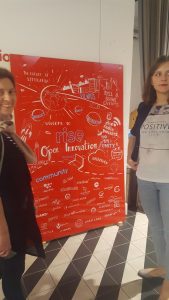
On the second day we visited RRT (COMUNICATIONS REGULATORY AUTHORITY OF THE REPUBLIC OF LITHUANIA). There we were presented with their work: CERT-LT helps people solve their problem with internet security and threats, that contains : how to be safe in the cyberspace, and Safer Internet which consists on children being safe online. This is another institution that we do not have in Albania and that we see very important and needed. We talked also for alternative ways how to develop some alerts on internet security in Albania and definitely AIS will consider to be engaged more in this direction also during GOW.
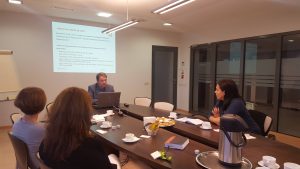
And as I mention before, we also visited one of the libraries of the city which offers many services. The librarians are trained to work as e-facilitators. In the library you could borrow books, e-readers, cd etc. You could even learn how to use a computer, or other internet services there, no matter what age you are. You could use their 3D printer to make models or you could try their 3D glasses to watch animated versions of Lithuanian famous book characters or other animations. And of course internet is for free.
They train librarians so they can make possible the contact between the youth and 55+. So practically the youths teach the elderly how to use computers or develop their digital skills and the elderly share life experiences with the youth. And this was a totally different experience from what we have head in Tirana. Libraries here are very small, old and without internet access. We don’t have an electronic system for searching or borrowing books even in National Library. Not only enjoyed visiting the library but also we turned back in Tirana with the idea of writing a concept idea to the Municipality Council before they decide to renovate Tirana Libraries.
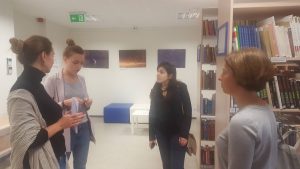
At the end we can say that this study visit was very important and successful for us. We did not only have a good time sharing our work experience and add some more important points in our Organizations agendas based on what we learned from each other but also got a possibility to visit some cultural spots. Hopefully we will have possibilities to work in a project together in the future.
